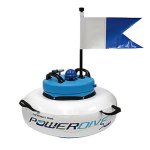The Scuba Doctor has an excellent range of complete Hookah diving systems (also known as Surface Supply Diving Systems). Hooka dive systems are an alternative to tank based scuba diving and allow descending underwater for extended periods of time with air supplied from the surface.
Hookah diving systems typically consist of a battery or petrol-powered air compressor that delivers air, through a long hose called a down-line, to the diver under the water. Hookah diving does not require the use of a BCD or a first stage regulator. Divers wear a harness, which is the attachment point for the down-line and optional weight belts. Divers use a second stage regulator that's specifically designed for use with a hookah system. A traditional scuba regulator will not work.
Hookah Dive System Types
There are two types of hookah dive systems: Dynamic and Static. A Dynamic system uses an air compressor to deliver air at the correct pressure. It has a holding or air reserve tank that provides constant pressure. As the air leaves the tank, more air is added to maintain the pressure. The compressor can be fixed or floating, and petrol or electric. A Static system uses a cylinder of compressed gas (often a scuba tank) as the air source.
A fixed compressor is placed on a dock or on a boat while in use. Floating means that the air source is on a floating platform that the diver pulls along with them.
Petrol vs Electric Hookah Dive Systems
Hookah systems are available in both petrol and electric-powered versions. Petrol systems typically power a higher output compressor, allowing one or two divers to dive and breathe easily. Most commercial hookah diving systems are petrol systems. Petrol systems do require more maintenance than electric versions. They're also a bit louder.
The more 'green' electric systems require less maintenance than petrol systems. They can be recharged on the boat, are quiet, easy to start and less prone to corrosion.
Electric units are more suited to families and fun, plus boat owners wanting to do some underwater maintenance at shallow depths. The petrol units are better suited for cray (lobster) and abalone hunting, plus commercial diving applications.
Please read Introduction to Hookah Diving for more information about things you need to consider with a hookah diving setup.





